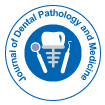The fear of dentistry and receiving dental care is commonly known as Dentophobia or dental anxiety
Received Date: Aug 04, 2023 / Published Date: Aug 30, 2023
Abstract
Dentophobia, also referred to as dental anxiety, is a prevalent psychological phenomenon characterized by an intense and irrational fear of dental procedures and receiving dental care. This fear can result in significant distress and avoidance behaviors, leading to compromised oral health and well-being. Individuals with dentophobia often experience heightened levels of stress, apprehension, and physiological reactions when faced with the prospect of visiting a dentist or undergoing dental treatments. Dentophobia can stem from various sources, including negative past experiences, fear of pain, feelings of helplessness and loss of control, and cultural influences. The impact of dentophobia extends beyond the realm of oral health, affecting individuals' overall quality of life and self-esteem. As a result, it becomes crucial for dental professionals to adopt patient-centered approaches that prioritize comfort, communication, and gradual desensitization techniques to alleviate the fears associated with dental care. Efforts to address dentophobia involve a combination of psychological interventions, such as cognitive-behavioral therapy and relaxation techniques, along with advancements in dental technology that minimize discomfort and pain during procedures. Additionally, providing comprehensive information to patients about treatment procedures and options can empower them to make informed decisions and reduce anxiety. Highlights the significance of understanding dentophobia as a common barrier to oral health care and emphasizes the importance of creating a supportive and empathetic environment within the dental setting. By recognizing the multifaceted nature of dentophobia and implementing strategies to mitigate its impact, dental professionals can contribute to improved oral health outcomes and overall well-being for their patients.
Citation: Dewan P (2023) The fear of dentistry and receiving dental care iscommonly known as Dentophobia or dental anxiety. J Dent Pathol Med 7: 172. Doi: 10.4172/jdpm.1000172
Copyright: © 2023 Dewan P. This is an open-access article distributed under theterms of the Creative Commons Attribution License, which permits unrestricteduse, distribution, and reproduction in any medium, provided the original author andsource are credited.
Share This Article
Recommended Journals
Open Access Journals
Article Tools
Article Usage
- Total views: 691
- [From(publication date): 0-2023 - Apr 05, 2025]
- Breakdown by view type
- HTML page views: 482
- PDF downloads: 209
